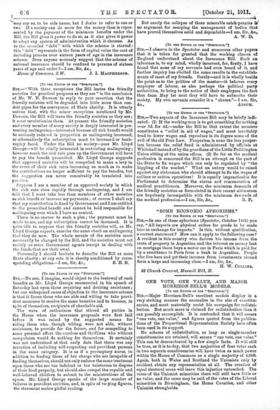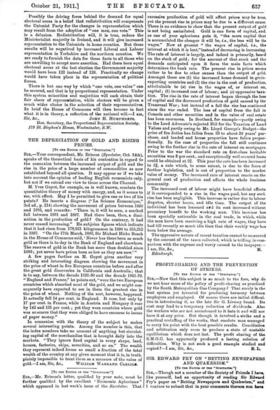ONE VOTE, ONE VALUE, AND MAJOR MORRISON-BELL ' S MODELS.
[To THE EDITOR. OP THE "SPECTATOR."] SIR,—Major Morrison-Bell's excellent models display in a very striking manner the anomalies in the size of constitu- encies, and must materially assist his campaign for redistri- bution. But ranch more is claimed for redistribution than it can possibly accomplish. It is contended that it will secure "one vote, one value," and figures quoted from the publica- tions of the Proportional Representation Society have often been used in its support.
No scheme of redistribution, so long as single-member constituencies are retained, will secure "one vote, one value." This can be demonstrated by a few simple facts. It will still be true, as it is to-day, that two majorities of four votes each in two separate constituencies will have twice as much power within the House of Commons as a single majority of 4,000. Again, both in Wales and Scotland the Unionists only by accident obtain any representation at all. The creation of equal electoral areas will leave this injustice untouched. The votes of the Unionist minorities there will still have little or no value, and the same may be said of the votes of the Liberal minorities in Birmingham, the Home Counties, and other Unionist strongholds.
Possibly the driving force behind the demand for equal electoral areas is a belief that redistribution will compensate the Unionist Party for the changes in representation which may result from the adoption of "one man, one vote." This is a delusion. Redistribution will, it is true, reduce the Ministerialist majority in Ireland, and it will give increased representation to the Unionists in home counties. But these results will be negatived by increased Liberal and Labour representation in Yorkshire and the northern counties. We are ready to furnish the data for these facts to all those who are unwilling to accept mere assertion. Had there been equal electoral areas at the last election the Government majority would have been 122 instead of 126. Practically no change would have taken place in the representation of political forces.
There is but one way by which "one vote, one value" can be secured, and that is by proportional representation. Under this system minorities and majorities will each obtain their fair share of representation, while electors will be given a much wider choice in the selection of their representatives. In brief the House of Commons will then become in fact what it is in theory, a reflection of the national will.—I am,
Sir, &c., JOHN H. HUMPHREYS, Hon. Secretary, the Proportional Representation Society. 179 St. Stephen's House, Westminster, S.W.















































 Previous page
Previous page